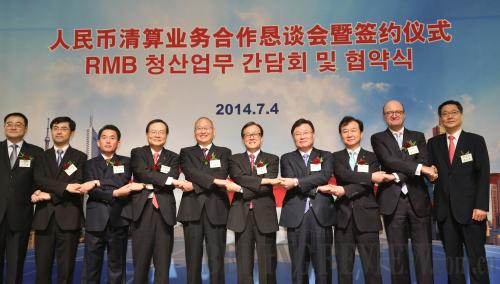|
 |
|
HAND IN HAND: Niu Ximing, President of China's Bank of Communications (fifth left), is present at the signing ceremony for renminbi clearing business held in Seoul, South Korea. The bank is appointed clearing bank in South Korea (CFP) |
On July 3, the People's Bank of China (PBC), the country's central bank, signed an agreement with its South Korean counterpart, the Bank of Korea, on establishing a renminbi clearing arrangement in Seoul to promote the use of renminbi in cross-border trade and investment.
Bank of Communications, China's fifth largest commercial bank, will be the designated renminbi clearing bank in South Korea. This action is just the latest undertaken by the PBC in its campaign to accelerate offshore yuan activities.
In June, China Construction Bank, the country's second largest commercial bank, was appointed the official yuan clearing bank in London, and Bank of China's (BOC's) Frankfurt branch was cleared to facilitate renminbi transactions in the German financial hub.
In addition, the PBC has signed memorandums of understanding with the central banks of France and Luxembourg to establish such arrangements in their respective capitals.
With these memorandums in place, the yuan's overseas clearing arrangements will cover 10 regions, including Hong Kong, Macao, Taiwan, Singapore, Malaysia, South Korea, the UK, Germany, France and Luxembourg. Deutsche Bank estimated that offshore deposits denominated in renminbi will reach an impressive 2.5 trillion yuan ($406.5 billion) by the end of 2014.
The recent renminbi clearing arrangements have been greeted by analysts as a milestone in the internationalization of the Chinese currency. The renminbi is not yet freely convertible under the capital account, so the role the currency can play is limited, said Zong Liang, Deputy Director of BOC's Institute of International Finance, when interviewed by 21st Century Business Herald. Clearing banks can facilitate and support offshore renminbi transactions through direct cooperation with the PBC, allowing for free and efficient cross-border flow of the currency, said Zong.
Zhao Xijun, Vice Dean of the School of Finance of Renmin University of China, said that renminbi clearing system is a type of financial "infrastructure." Clearance and settlement of renminbi forms the basis for the use of the currency in foreign countries, and the building of this necessary "infrastructure" involves the advancement of various transactions, products and business operations, all factors vital to accelerating the currency's internationalization.
A growing presence
Frankfurt is also home to the European Central Bank (ECB), and the PBC and ECB have also signed a currency swap agreement. "Thus the PBC can now systematically carry out transactions in the eurozone and evaluate the overall clearance and transactions in the zone through cooperation with the ECB and the clearing banks," Zong said.
"Since the euro is the second largest currency in the world, and international financial centers in Europe allow access to vast markets, both the yuan's internationalization and the innovation of yuan offshore products will be amply facilitated," he continued.
Zong thinks Europe is a region with great potential for the development of a renminbi market. China-Europe relations are currently developing at a rapid pace, providing a good opportunity for Europe to accept the yuan. "This will benefit both sides," he said.
According to Zhao, as Paris, Frankfurt and Luxembourg are regional and international financial centers, their markets will certainly be eager to expand the range of financial businesses, services and products they can offer, as well as to increase the number of financial institutions and clients. Meanwhile, the renminbi is the currency of the world's second largest economy, and China's foreign trade, investment and financing activities are becoming increasingly brisk. Therefore, the development of renminbi business in these European cities will help to consolidate their positions as international financial centers, said Zhao.
Back in Asia, industrial insiders have speculated that the deal with South Korea means that China is taking the first steps in laying out renminbi offshore centers across northeast Asia. Cooperation between the central banks of China and South Korea has been in progress. China's first bilateral swap agreement was signed with South Korea in 2008.
|
